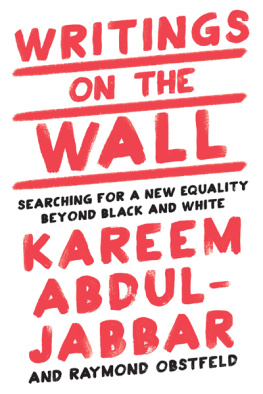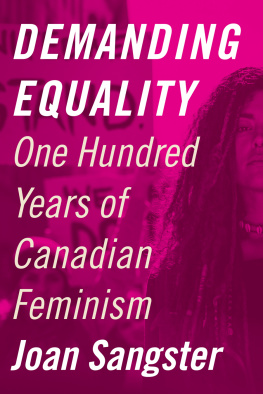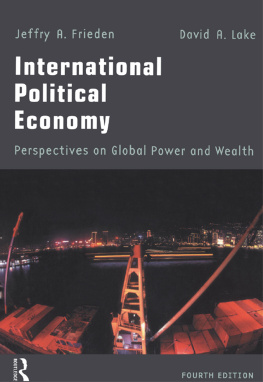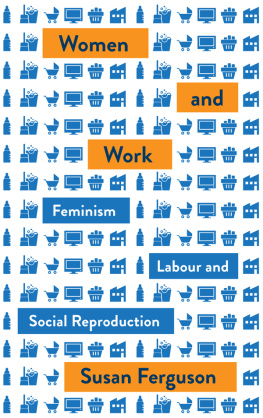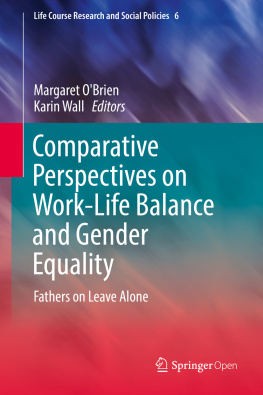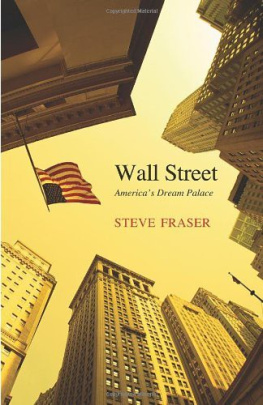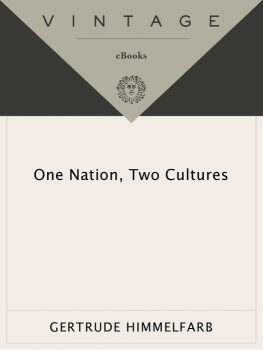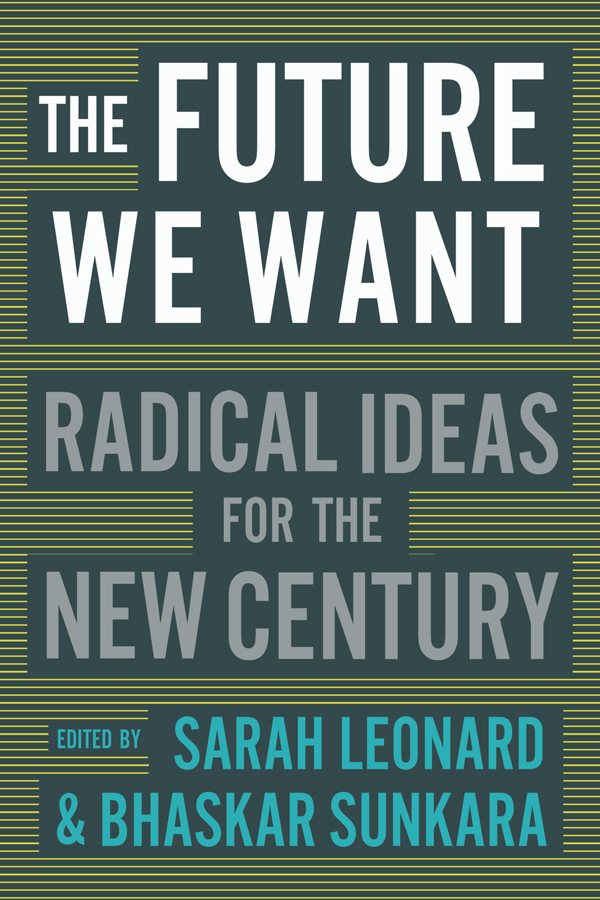Contents
Guide
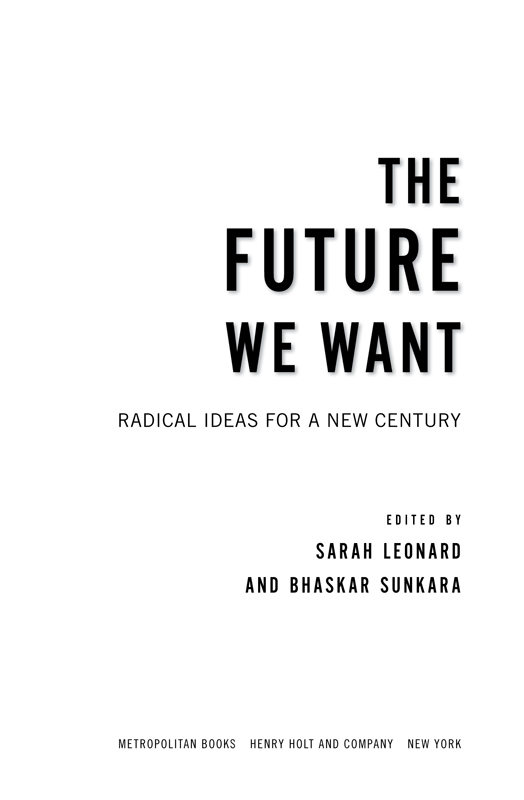
The author and publisher have provided this e-book to you for your personal use only. You may not make this e-book publicly available in any way. Copyright infringement is against the law. If you believe the copy of this e-book you are reading infringes on the authors copyright, please notify the publisher at: us.macmillanusa.com/piracy.
Sarah Leonard
Every election season is a time of bemoaning why millennials wont vote for politicians boldly committed to picking at the edges of their problems. Consider a snapshot of the situation young people face: the unemployment rate for workers under age twenty-five is 18.1 percent; unemployment for black people who have not graduated from high school is 82.5 percent; the people most likely to be shot by police are black twenty-five-to-thirty-four-year-olds; the national student loan debt has surpassed $1 trillion; and the only jobs lucrative enough to pay off college loans are in the financial industry that detonated our economy or Silicon Valley companies deregulating working-class industries.
The future doesnt hold much hope either, with median household income declining 12.4 percent between 2000 and 2011. Having a family is simply harder to afford now. Meanwhile, each new year sets another low record for union density, meaning we have few levers for turning those income numbers around. Unlike most wealthy countries, the United States lacks universal child care and maternity leave, so women are stuck with the same old debates over an impossible work-life balance.
We were told that in the knowledge economy good jobs followed higher education; there are few jobs, and we lock ourselves into miserable ones as quickly as possible to feed the loan sharks. The magazine writers who report on self-indulgent twenty-somethings (think Time s The Me Me Me Generation cover), the well-meaning guidance counselors who coach kids to invest in themselvesthey should save their breath. You dont need a college course to know when youre getting screwed.
The most grotesque feature of the 2016 election is the razor-thin spectrum of solutions proposed by the front runners to a historic set of problems. Lost in the noise of the 2016 election cycle is the fact that no viable candidate offers any hope for a radically more equal society: the policies on offer would merely mitigate the dire inequality that has been growing since Reagan. And this is despite the fact that a majority of Americans express widespread discontent with the countrys extreme consolidation of wealth: about three in four Americans think that inequality is a serious problem in the United States. (This places Americans in the mainstream of world opinion, where in all forty-four nations polled by Pew, people think inequality is a big problem facing their countries.) It is this popular dissatisfaction that no doubt accounts for the unexpected surge of support for the unlikely long-shot Democratic candidate, Vermont senator Bernie Sanders, an avowed socialist.
Indeed, the most obvious source of this elections futility is that popular opinion, expressed through elections, has essentially proved to have no influence on policy. According to a now-famous 2014 Princeton and Northwestern study measuring influence in American politics, economic elites and organized groups representing business interests have substantial independent impacts on U.S. government policy, while mass-based interest groups and average citizens have little or no independent influence. On key issues like gun control, financial reform, and education spending, the policymakers divergence from popular opinion has been particularly stark.
The United States is now, in effect, an oligarchy. Beyond this sad reckoning lies an even more fundamental problem: there is no better alternative on offer. We need a vision of a better future, one that turns our modern capacity for abundant food, shelter, and health into a guarantee that no one will suffer for their lack.
So when people demand that we vote, you can see why the answer comes back: for what?
The economic crash was not just an ugly fluctuation that were all trying in good faith to correct. It has provided cover for neoliberal benefit rollbackscutting government services in the name of budget crisesin which all of these candidates have participated. Vulnerable people who need the services the most get screwed first: the young, the old, the poor. Eligibility for unemployment benefits has been tightened and opportunities to extend them rejected because we cant afford them.
A college education is edging beyond reach for many of us. In 2012, Congress restricted Pell grants for low-income college students. While national student debt has surpassed $1 trillion, the federal government has made it impossible to default on these college loanseven your Social Security can be garnished to pay them off. And before students even make it to college, they are subjected to schools with such attenuated budgets that physicians have started prescribing Adderall to poor kids to keep them focused in unruly classrooms whether they have ADD or not. In the words of one doctor, Weve decided as a society that its too expensive to modify the kids environment. So we have to modify the kid.
Perhaps its wise to modify the kid for the brave new world that will await her: one with constantly shifting and disappearing jobs and no safety net of any kind. It is a truism now that no one expects one career. Most people now in college or high school will have six jobs by the time theyre twenty-six. And let us not mistake flexible work for fulfilling work. This is an age when the power of the boss is so ascendant over the power of the worker that we can be shuffled around to match precisely the needs of capital. Department stores and retailers now use apps that will inform an employee midway through a workday if their services are no longer needed to match customer demand. About half of early-career hourly workers learn their schedule for the week less than one week in advance. A full days work, or a steady job, is a thing of the past. This is a chronically unstable way to operate in the world, picking up bits of knowledge work, service work, or manual labor as needed.
When asked what factors led to such a dramatic divide between the needs of the average citizen and the actions of the state, Princeton sociologist Martin Gilens, co-author of the 2014 study measuring influence in American politics, cited moneyed lobbying on the one hand, and the lack of mass organizations that represent and facilitate the voice of ordinary citizens, on the other. Part of that would be the decline of unions in the country, which has been quite dramatic over the last 30 or 40 years, Gilens added. And part of it is the lack of a socialist or a workers party.
It is not only in the United States that unions are crumbling and the safety net is being torched in the name of leaner, more responsible budgets. The Eurozone, which was once touted as the means to a prosperous and peaceful continent, has revealed itself to be nothing more than a continental system of extraction.
Poor countries in southern Europe borrowed money from foreign banks before the devastating financial crisis of 2010, only to find themselves unable to pay them back. To protect the euro, much of this debt was restructured and taken over by the troikathe International Monetary Fund, European Commission, and the European Central Bankthat then forced countries such as Greece, Spain, and Italy to cut social spending to pay off the debts. Now in Greece, for example, unemployment has hit 25 percent in part due to huge public-sector cuts, and infant mortality, suicide, and addiction are all on the rise because the troika has required cuts in health care spending.



